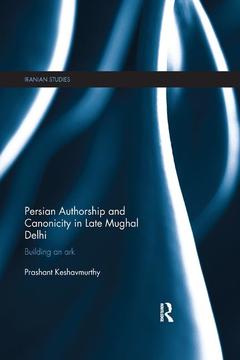Persian Authorship and Canonicity in Late Mughal Delhi Building an Ark Iranian Studies Series
Auteur : Keshavmurthy Prashant

Writing in the eighteenth century, the Persian-language litterateurs of late Mughal Delhi were aware that they could no longer take for granted the relations of Persian with Islamic imperial power, relations that had enabled Persian literary life to flourish in India since the tenth century C.E.
Persian Authorship and Canonicity in Late Mughal Delhi situates the diverse textual projects of ?Abd al-Q?dir ?B?dil? and his students within the context of politically threatened but poetically prestigious Delhi, exploring the writers? use of the Perso-Arabic and Hindavi literary canons to fashion their authorship. Breaking with the tendency to categorize and characterize Persian literature according to the dynasty in power, this book argues for the indirectness and complexity of the relations between poetics and politics. Among its original contributions is an interpretation of B?dil?s Sufi adaptation of a Braj-Avadhi tale of utopian Hindu kingship, a novel hypothesis on the historicism of Sir?j al-Din ?Al? Kh?n ??rz??s oeuvre and a study of how Bindr?ban D?s ?Khvushg?" entwined the contrasting models of authorship in B?dil and ?rz? to formulate his voice as a Sufi historian of the Persian poetic tradition.
The first book-length work in English on ?Abd al-Q?dir ?B?dil? and his circle of Persian literati, this is a valuable resource for students and scholars of both South Asian and Iranian studies, as well as Persian literature and Sufism.
Prashant Keshavmurthy is Assistant Professor of Persian-Iranian Studies in the Institute of Islamic Studies, McGill University. His research interests include late Mughal political discourses, Safavid-Mughal commentarial practices, Persian-Urdu poetics, Persian translations of Indic language works and Islamic autobiographical discourses.
Date de parution : 12-2019
15.6x23.4 cm
Date de parution : 02-2016
15.6x23.4 cm
Thème de Persian Authorship and Canonicity in Late Mughal Delhi :
Mots-clés :
Eighteenth Century North India; Persian Language Poets; literary; Persian Literary History; history; Late Mughal; biographical; Persian Literary; compendium; Mughal Delhi; tradition; Persianate Literary Culture; couplet; Raja Bhoj; refrain; Ghazal Style; language; Aesthetic Mood; poets; Mughal India; persianate; Couplet Refrain; Paul Losensky; Target Language Cultural Values; Biographical Compendium; Word Formation; Linguistic Purity; Persian Literary Tradition; Holy Men; Persian Poetic Tradition; Extramission Theory; Mughal Painting; Poetic Topoi; Naval Kishor; Mus Mir
